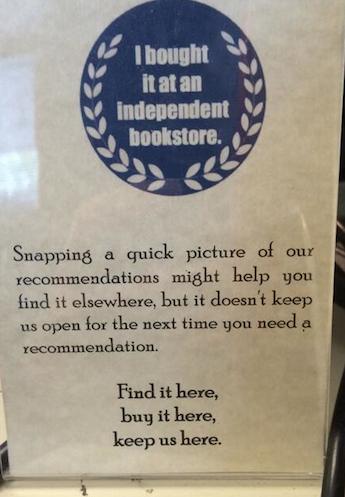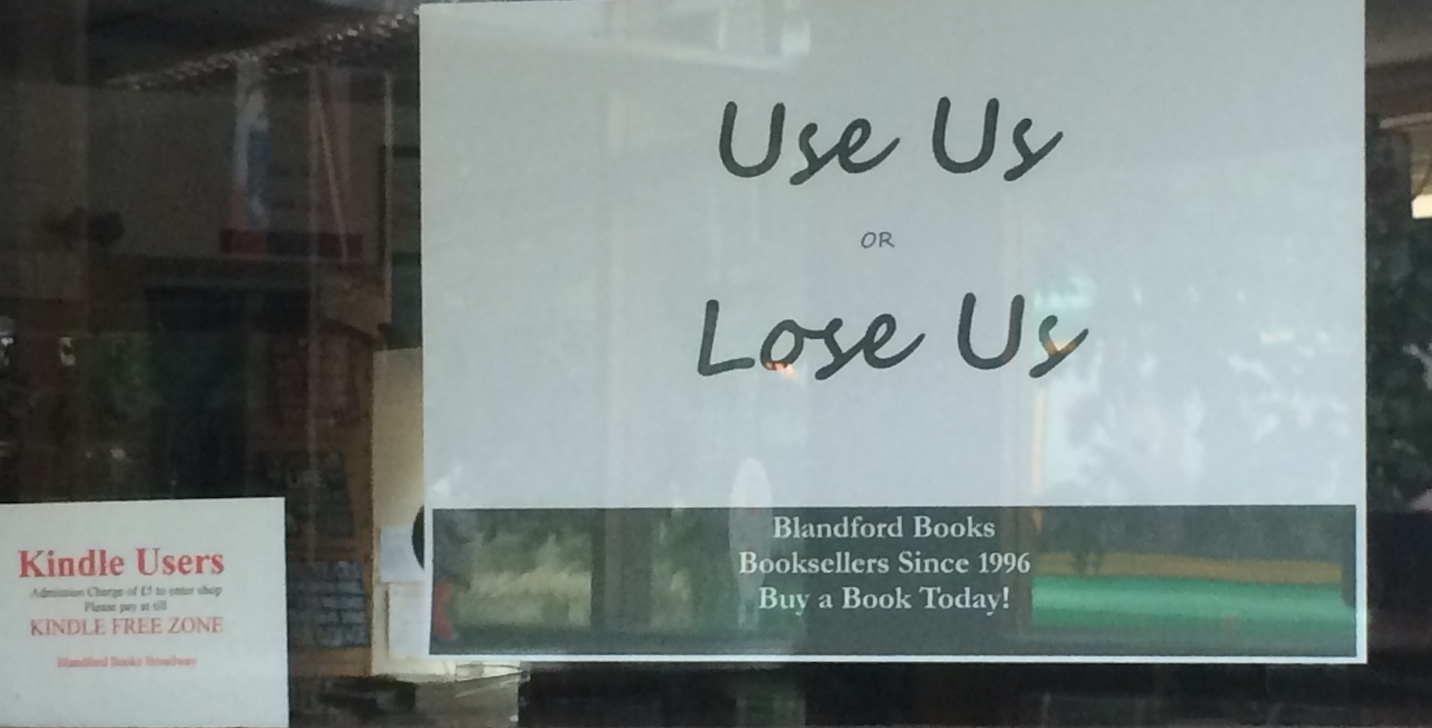Amazon made news again yesterday when it unveiled its the Fire phone (read the announcement here). That Amazon has entered the smartphone arena seems fitting for Jeff Bezos’s ego, but I doubt it will make a dent in the iPhone or Android market. But this Fire phone has some scary technology that continues to cement the closed loop of Amazon users: “…a further means of locking consumers into the Amazon ecosystem” by allowing people to snap a photo, or a jacket blurb, or even part of the text on the page and then be taken right that product’s page on Amazon’s website where they can download the book in the store. Once again, Bezos and his merry band of players are trying to take it right to the heart of the indies, although, really, as my coworker Darrilyn aptly said: “Don’t you think people who get this phone don’t set foot in a bookstore, or any store anymore?”
Turning bookstores so aggressively into showrooms for Amazon is just another attempt for Bezos to  try to dominate the bookselling market. The Fire phone announcement came at an interesting time, though. The dispute with Hachette is finally getting much more mainstream press and customers are asking us about it. And there’s nothing like a little education from the local indie to make book lovers enraged at the nerve of Amazon to make it so easy to browse a real bookstore all the while ordering books to read on their phone screen and then share on bigger screens when they get home and link up the phone with their Kindle.
try to dominate the bookselling market. The Fire phone announcement came at an interesting time, though. The dispute with Hachette is finally getting much more mainstream press and customers are asking us about it. And there’s nothing like a little education from the local indie to make book lovers enraged at the nerve of Amazon to make it so easy to browse a real bookstore all the while ordering books to read on their phone screen and then share on bigger screens when they get home and link up the phone with their Kindle.
Here’s the thing, though. Store owners have had enough. Even before the Fire phone announcement, several friends shared photos with me about signs seen at registers in stores. The first has been making the rounds on Twitter. This very simply says what happens when you take a picture of a book and then buy it somewhere else: Bookstores can close.
Even across the pond, in England, bookstores are visibly angry and fighting back. My staffer, David, is touring the country with his family and emailed this picture yesterday morning. 
What I love about this is the sign actually is requesting that people who come into the store with a Kindle to pay 5 pounds at the till when they enter the shop. Declaring the store a Kindle-free zone is a ballsy move. I’d love to talk to the store owner about feedback for the sign. My guess is it’s bringing people right up to the window and chuckling a bit, and then realizing that the store needs people to actually buy books, not just browse and order elsewhere. Starting a conversation is the best way to make a point and this sign succeeds.
Store owners: what are you doing in your store with signage to combat Amazon and educate customers?

I do reverse showrooming. I see books online and buy them in local bookstores. I expect an Amazon drone will attack my house any day now…
I’m sure this has been covered before but it’s been an issue in my store lately: what do you SAY?
Multiple times in the past two days I’ve handsold my heart out (“The Glass Sentence,” to be precise) and really hooked customers. Who then say something along the lines of, “This sounds wonderful! I absolutely have to read this! I’ll download it from Amazon when I get home.” Or to a child, “This sounds perfect to get on your Kindle.”
As a regular salesperson (non-manager/owner/etc) who still feels punched in the gut by these words, does anyone have any advice for something tactful and not directly critical to say to these people to remind them that not only do we (an indie store) rely on their sales, but a real person just sold them on the book, not an algorithm?
Hi there,
Great question which I’ve addressed in today’s blog http://blogs.publishersweekly.com/blogs/shelftalker/?p=13413
I totally agree with buying local and supporting Indie bookstores. I’d like to warn booksellers not to jump to conclusions when a customer snaps a picture of a book or writes a title down. I love seeing new books on display, but I can’t buy every book I see when I see it, and I have a horrible memory for titles and know that when a book is no longer featured in a bookstore, I will no longer remember the title. I love to snap pictures in order to remember a book for later when I can return to the store and buy it (rather than saying to a bookseller “well, it was blue and on this table 6 months ago”).
The humanity and warmth of a bookstore is a world separate from entering a book in the computer cart. Even a slight premium for the joy is well worth it.
A.L. Mitchell